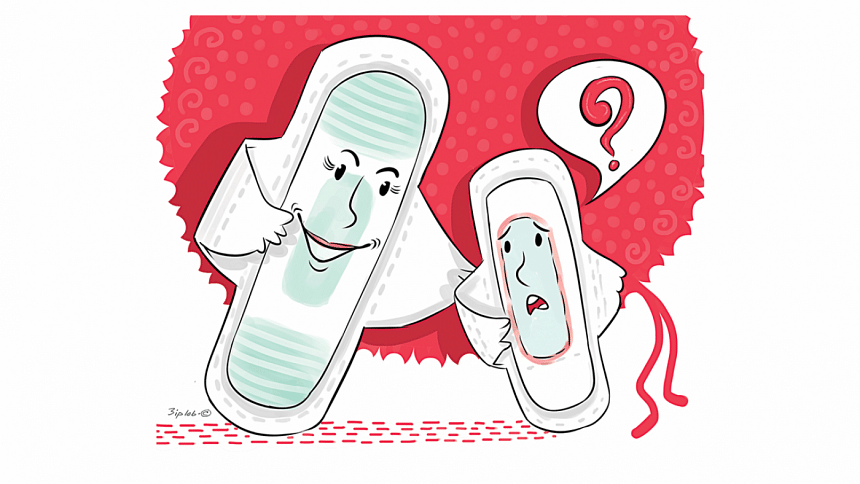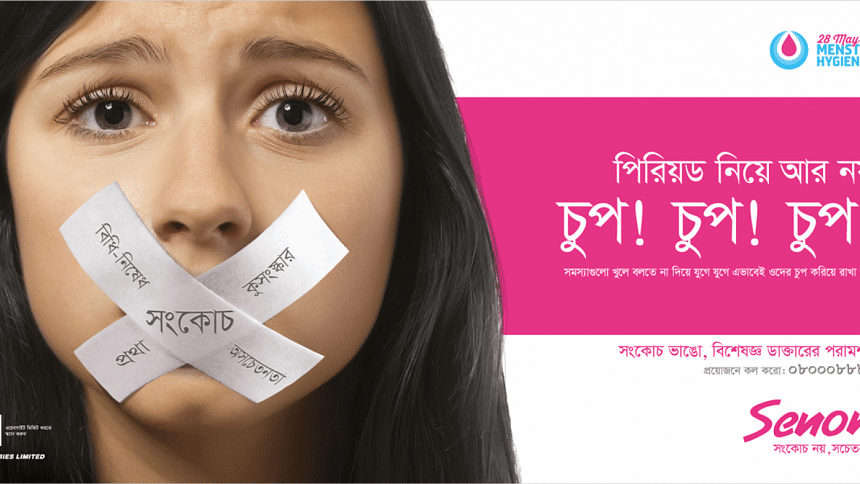Menstruation is not a problem, poor menstrual hygiene is

Maisha Rafa Khan is a young professional working at private company. As with any job, long hours are sometimes unavoidable and Khan is no stranger to the concept.
"I am grateful for some of the initiatives that my workplace has taken for women. There are sanitary pads available at work, which has been helpful at times," says Khan, "But sometimes, during a long stressful day, I forget to change my pad. I think paid vacation days for periods would help alleviate this problem."
There are many other women like Khan, who face the challenge of dealing with eight-hour workdays while menstruating. In Bangladesh, around 52 percent of the female population are of reproductive age and are therefore experiencing monthly periods. But the challenges that come with menstruation aren't the only problems women have to face.
Menstruation is still treated as a taboo in Bangladesh, with discussions about menstrual health and menstrual hygiene management (MHM) only happening behind closed doors. The result is an overall lack of awareness around MHM and menstruation in general. In some cases, women themselves are not aware of the proper hygiene practices.
This can be attributed to not only the topic being considered a taboo, but also due to the lack of information and knowledge regarding sexual and reproductive health and rights (SRHR).
This tends to disproportionately affect women in lower-income groups, such as those working in the ready-made garment (RMG) sector. These women have limited access to information regarding proper MHM practices, and healthcare products such as sanitary napkins account for a significant proportion of their income.
An internal study by Square Toiletries Limited (STL) showed that almost 97 percent of Bangladeshi women suffer from vaginitis due to unhygienic menstrual practices. When observed in conjunction with a report from HERProject which showed that female RMG workers miss six days of work on average per month due to menstruation related reasons, the issue becomes even more serious.
Another problem that continues to persist in Bangladesh and other developing countries is the lack of knowledge about proper MHM practices among young girls. Not only do families avoid discussions on the topic, but sometimes even mothers do not educate their daughters on how to maintain proper hygiene. Factoring in the fact that schools rarely educate students regarding MHM or SRHR, it is no wonder that a lot of young girls suffer from menstrual problems and vaginitis.
Societal taboos make it difficult for women to procure menstrual products. A survey conducted by STL showed that most women only buy products from remote shops, as they want to avoid being seen purchasing sanitary napkins since people tend to harbour a judgemental attitude.
Even worse is the fact that in rural areas, people believe that menstruation is a sign that girls should be married off. Within four years of menstruation, almost 66 percent of girls are married off. This has a great impact on the economy, as it prevents a lot of young women from being economically active.
Slowly, progress is being made in terms of awareness and availability of menstrual products. According to the National Media Survey conducted by Kantar in 2018, 23 percent of Bangladeshi girls use sanitary napkins. Previously, according to a government survey, it was 14 percent.
Senora has designed and implemented various campaigns raising awareness on MHM and SRHR. Through these various programmes, they have reached six million Bangladeshi girls, helping a whole new generation of women learn about proper MHM practices.
"COVID-19 pandemic has exacerbated period poverty mainly due to the financial crisis triggered by the continued lockdown. Women prefer cheaper alternatives to sanitary pads due to lack of accessibility and affordability leading to poor reproductive health," said Dr. Shajia Fatema Zafar, Praava Health's Consultant Gynecologist. "Menstrual Hygiene Day gives us an opportunity to raise awareness and to include sanitary products in the list of essential commodities. This will help every woman and girl manage her menstruation safely and hygienically with confidence."
There are opportunities for a lot of initiatives to be taken. While traditional awareness regarding MHM is a must, we should also be looking into reducing the stigma around the concept of menstruation. The topic of menstruation should not be viewed as abnormal and, therefore, should be normalised so that both men and women can more comfortably engage in conversations on how to better help women maintain their SRHR.


 For all latest news, follow The Daily Star's Google News channel.
For all latest news, follow The Daily Star's Google News channel. 








Comments